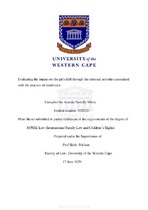| dc.description.abstract | Ukuthwala is an ancient cultural practice that has been exercised in various parts of South Africa, especially in the Eastern Cape. It occurs in different communities and is informed by traditional beliefs. The man’s family devises a plan to bring the girl to their compound without her knowledge. In some instances, this plan is formulated together with the girl’s family, but when the man’s family acts without the prior knowledge of the girl’s family, they are obligated to inform them by means of a letter, or by delegating a family member, that their daughter is not missing. Furthermore, the man’s family will request a day with the girl’s family for lobolo (dowry) negotiations for the girl. The girl’s family will oversee the process of ukuthwala to ensure that all the requirements are met and that there is mutual understanding between the families; however, this is done without the involvement of the girl child (Mjwara, 2014). | en_US |

